|
22 High Street
Queenborough
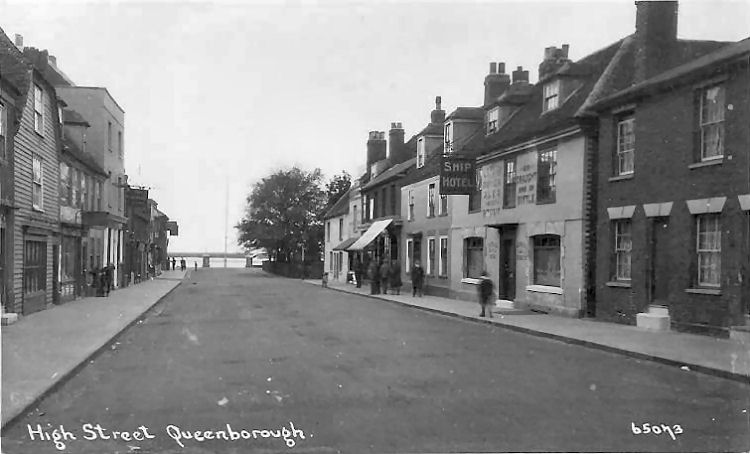
Above postcard, date unknown, kindly sent by Richard Murr. |
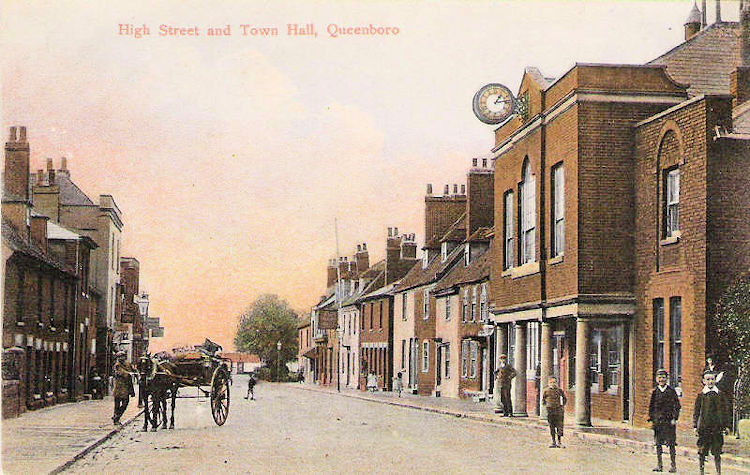
Above postcard, date unknown. |

Above postcard, date unknown, also showing the "Ordnance
Arms" on the right. |
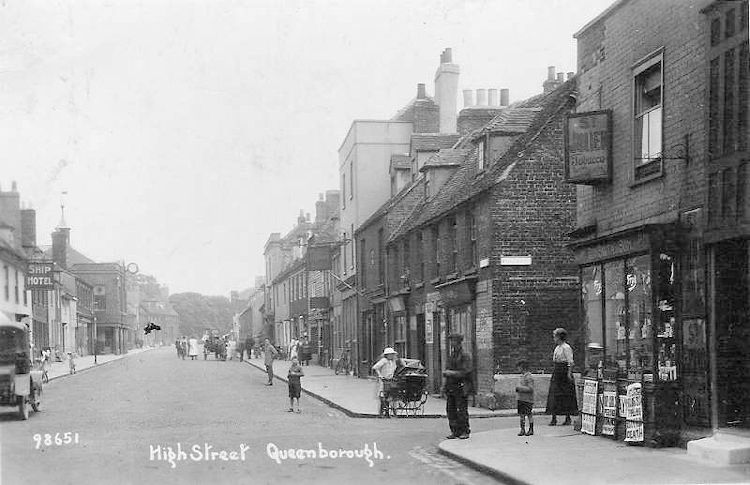
Above postcard, date unknown. |
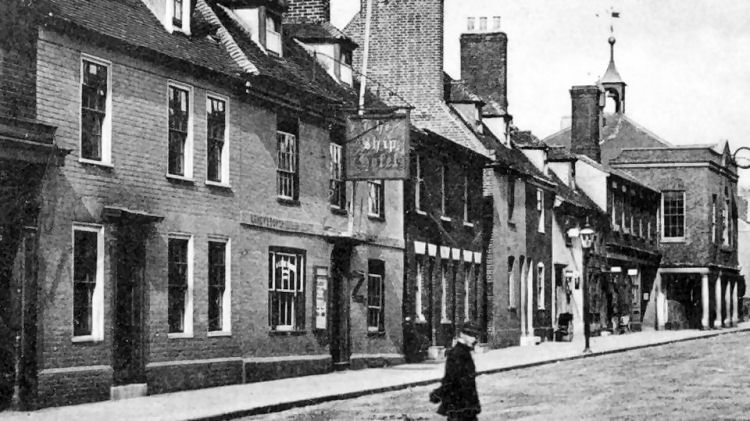
Above photo, date unknown, kindly sent by Richard Murr. |
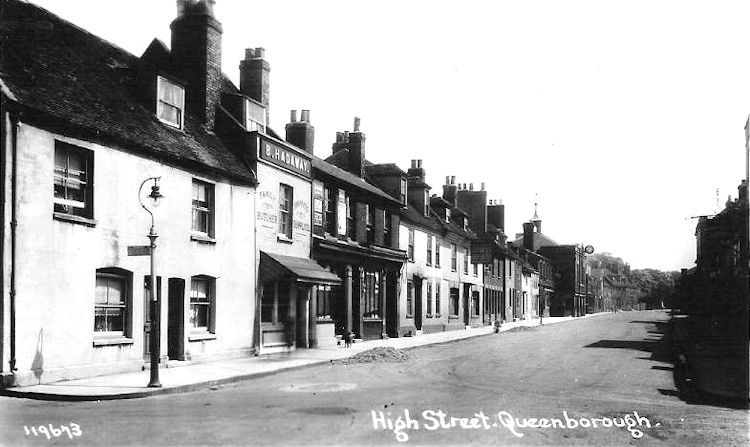
Above postcard, date unknown. |
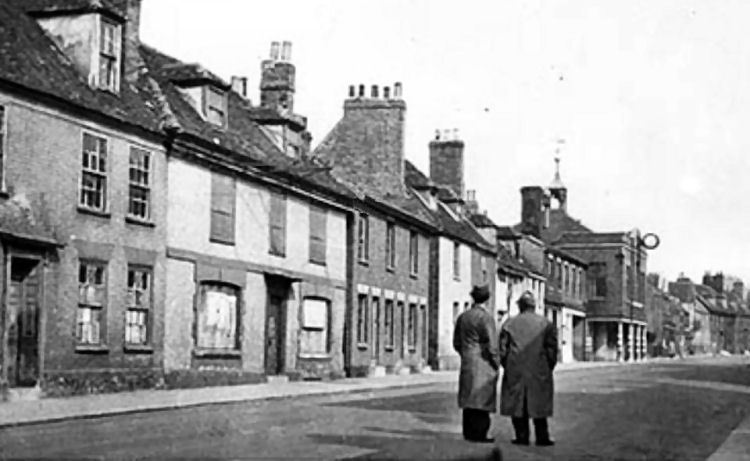
Above photo, circa 1940, kindly sent by Richard Murr. |
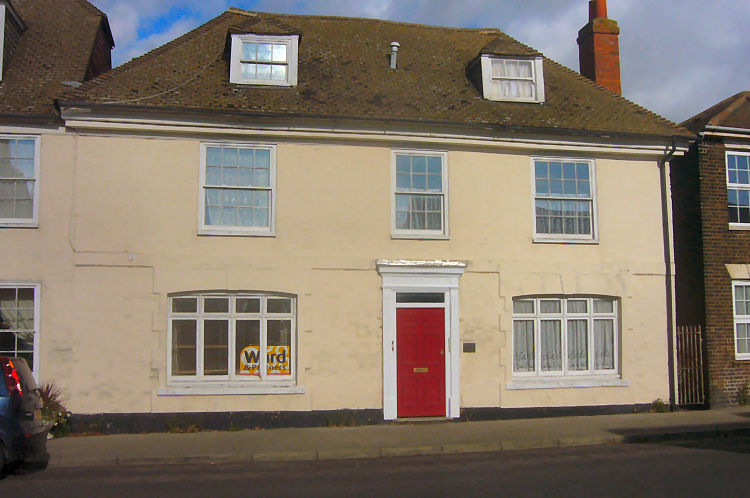
Above photo, 2017, kindly sent by Richard Murr. |
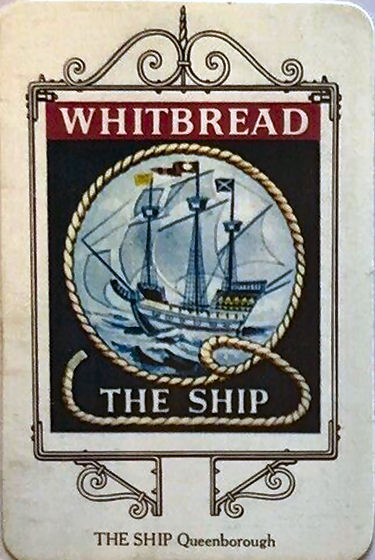
Above Whitbread card, 1973 and series unknown. |
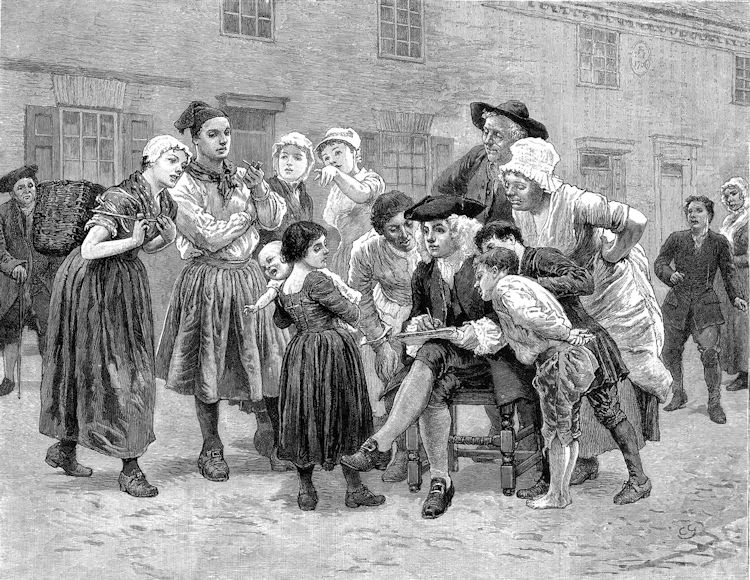
Above drawing says the following:-
Hogarth Sketching The One Street.
Then to our Inn returning there
We borrowed a great wooden chair.
And plac'd it in the open street
Here in much state did Hogarth sit.
To draw the Town-house, Church, and steeple
Surrounded by a crown of people.
Tag, rag, and hobtail stood thick there,
And cried, "What a sweet pretty picture!" |
Public house that probably dates from the 18th century although there may
have been an inn on this site by 1686. It was known as the "Ship" and named
as such in 1827 when its lease was acquired by Stephen Hobday from John
Capel and in all probability known as such before this date. It is a
double-fronted building, of two storeys with attics, possibly built with a
four-room plan with side stacks. It is said to have been formed from two
houses on the corner of 20, and 22 High Street and claims to be where
William Hogarth stayed on a visit to the town.
Supplied by Alfred Leney Co Ltd, who bought out Thomas Walker's Phoenix
Brewery in 1859 and registered as such in 1896, until bought out by Fremlin
Brothers brewery of Maidstone in 1926, brewing at the Dover brewery ceased
in 1927, which later passed to Whitbread.
I believe the pub closed some time in the 1930s.
The interior was extensively altered during an extensive modernisation in
1983 and today has a Grade 2 listing.
During the 1950s and 60s the premises operated as a youth club.
|
Kentish Gazette, Tuesday 23 June 1772.
To be sold by auction, by Mr. John Smith, at the "George Inn" at
Sittingbourne in the County of Kent, on Monday the 17th day of July
next, and the 6 following days (Saturday excepted.)
All the Post Chaises, Post Coach, Horses, Household Furniture, Plate,
Linen, China, a large Quantity of Wine, Brandy, Rum and other effects,
late belonging to Joseph Jones, a bankrupt; and also the Lease of the
said Inn, with the Appurtenances thereto belonging, for the remainder of
a term of 14 years, whereof there were 12 years unexpired at Lady-day
last.
The Goods to be viewed the Friday and Saturday before the day of sale,
and catalogues may be had, after the 1st of July, at the "George Inn" at
the Borough of Southwark, at the "Marquis of Granby" at Dartford, at the
"Crown" at Rochester, at the "Mitre" at Chatham, at the
"Ship" at
Queenborough, at the "Dolphin" at Faversham, at the "Antwerp" at Dover,
at the "Saracens Head" at Ashford, at the "Fountain," the "Red Lion,"
and "Kings Head" at Canterbury, at the "Star Inn" at Maidstone, at the
"Dover Castle" at Greenstreet, at the "George" and "White Hart" at
Milton, at the "Green Lion" at Rainham, at the
"Rose,"
"George," and "Red Lyon," at Sittingbourne, and of Mr. John Smith, Auctioneer, at
Sittingbourne.
|
|
Kentish Gazette, Tuesday 23 September 1788.
All that Genteel Household Furniture, Plate, and China, of Mr. James
Ongley, deceased.
At his late Dwelling House, in Queenborough, Isle of Sheppey; consisting
of Fine Goose and other Feather Beds, Bolsters, and Pillow; Four-post
Bedsteads, with Cotton, Linen, and Harateen Furniture; Blankets, Quilts
and Counterpains, Mahogany and Walnut-tree double and single Chests of
Drawers; ditto Bureaus, Mahogany square and oval Dining Tables; ditto
Card and Tea Ttables, exceeding good Mahogany Chairs, with Hair Seats;
good friend Beech and other Chairs; Bath and Steel Stoves; Brass and
Steel Fenders and Fire Irons; an Eight Day Clock in a Japan Case; Pier
and Swing Glasses in Mahogany and other Frames; some handsome Silver
Plate; a Quantity of Tea and other China; a Variety of Kitchen and other
Furniture, as will be inserted in the catalogues.
The sale to begin each day at 11 o'clock in the forenoon, and Catalogues
of the whole may be had on Monday preceding the sale at the
"Ship,"
Queenborough; the auctioneers, Milton; and the Place and Time of Sale.
|
From the Kent Herald,
14 February 1833.
Marriage.
Feb. 6, at Minster, Sheppey, Mr. George Hall, of the "Ship Inn," Queensborough, to Miss Isabella Burgess.
|
|
From the Kentish Gazette, 9 January 1838.
On Christmas day, Mrs. Greet, widow of the late T. J. Greet, Esq., of
Queenborough, invited all the widows of that town to dinner
at the "Ship Inn." Mrs. Greet’s benevolence was cheerfully responded to,
and the dinner, which consisted of roast beef and plum
pudding, was a most excellent one, the pudding being of the real
Christmas kind. Many of the poor old women declared that they
never had such a dinner.
|
|
From Hampshire Telegraph and Sussex Chronicle etc (Portsmouth, England), Saturday, June 26, 1847; Issue 2490.
INSOLVENT DEBTOR
To be heard at Maidstone, in the county of Kent, on the
13th day of July, 1847, at the hour of ten in the forenoon precisely.
Charles William de Courcy Ross (sued and committed as Charles W. de
Courcy Ross), formerly of the North Walls, in the parish of Saint
Martin, Winchester, Hampshire; then of Chilcomb, Hampshire; then of
Westbourne, Sussex; then of Upper Berkeley-street, West Middlesex; then
of Westbourne aforesaid; then of Saint George's-square; Portsea,
Hampshire; and late of the "Ship Inn," Queenborough; Isle of Sheppy,
Kent; the whole time a Commander in her Majesty's Royal Navy on half
pay.
Nicholls and Doyle, 48, Bedford-row, For Charles Morgan, Maidstone.
|
|
From the Kentish Gazette, 3 November 1857.
QUEENBOROUGH. Singular Death of a Child.
There has been considerable excitement here for some time, in
consequence of the death of a child under peculiar circumstances. An
inquest on the body was held on Saturday, the 24th instant, at the
"Ship Inn," before T. Hills, Esq., coroner. It appeared that the
deceased, William Pilcher, was with other children in the churchyard
and during the temporary absence of the sexton some bigger boys
threw five young children into a half-tilled grave, which, however,
was very shallow. The children scrambled out very much frightened,
particularly deceased, who, on returning to his home, complained of
great cold, and during the night asked frequently for water. On the
following morning he was seized with convulsions, which assumed a
tetanic character, and which continued till Tuesday evening, when
the child died. A post mortem examination having shown a perfectly
healthy condition of the bodily organs, the fright might or might
not have been the cause of convulsions and ultimate death. The jury
returned a verdict of "Died from convulsions, but the cause of such
convulsions does not appear to the jury." The coroner administered a
severe reproof to the boys implicated.
|
|
Sheerness Guardian 17 December 1859.
QUEEBOROUGH PETTY SESSIONS.
Before L. S. Magnus, Esq., Mayor, and S. J. Breeze, Esq.
On Monday the 12th inst, three respectable looking young men, named
Daniel Leddell, a joiner, Charles Hammond, a sawyer, and John
Gallagher, a sailmaker, all residing in Blue Town, Sheerness, were
charged on remand, with stealing four fowls value 8s., at Queenboro'
on Sunday the 4th of December, the property of Mr. Obadiah White.
Mr. Obadiah White of the "Ship Inn" Queenborough, (who gave his
evidence reluctantly), stated that about 5 o'clock on the day in
question, the parties accused, had something to drink at his house.
Alter staying a few minutes they left by the back door. Shortly
afterwards he missed 4 fowls, and found 3 fowls' heads left behind.
He proceeded to Sheerness, and gave information to the police.
During the same evening, he saw some fowls at the police station,
but could not say they were his property. The skin of one of them
was now produced, but witness could not swear to it.
William Normile, son of Michael Normile, of Blue Town, deposed that
he was on Queenborough wall, on the night of the robbery, and saw
Charles Hammond lying on the wall drunk. With the assistance of a
boy named Wheller, and another named Jones, he got Hammond home. He
did not see that Hammond had a fowl. If Hammond had one he must have
seen it. He denied telling police-constable Okill that Hammond had a
fowl, and that he had several times asked for it.
George H. Okill. P.C., 187, stated that he met Hammond on the wall
about six o'clock in the evening of the 4th. He was drunk, and two
boys were leading him, one of whom was carrying a dead fowl. On the
evening of the 11th, he spoke to the witness Normile on the subject,
when the latter stated that Hammond did have a fowl and that the
boys carried it for him; also that Hammond asked for it several
times on his way home.
The boy Normile was then re-called, and flatly denied the
policeman’s statement.
George Palmer, (teller to the plaintiff,) deposed to the loss of the
fowls, but could not identify the heads and skin produced.
Sergeant Ovenden, deposed as follows:— On information being given to
me of the robbery, I went to Leddell's house. At my request two
fowls were produced. I asked Daniel Leddell where he obtained them?
He said they were given to him. I said who by? He replied that he
didn't know. I took possession of the fowls and apprehended D.
Leddell. I found two more fowls at the house of Gallagher, and one
at the house of Hammond. Gallagher was soon afterwards brought to
the station, when I asked him to account for the possession of the
fowls. He replied that Leddell had killed them and given him them.
Hammond was also brought to the station, I asked him where he
obtained the fowl, and he replied that Leddell had asked him to
carry it. On the same evening I showed the fowls to Mr. White, when
he pointed out one and said "that is my Tommy, I will swear to it."
At this stage of the proceedings, superintendent Green asked for a
further remand, on the ground that gross perjury had been committed
which required investigation.
The same three prisoners, were then charged with stealing a fowl
from the "Rose Inn," at Queenborough, on the same day, value 2s. The
case was not gone fully into, as the magistrates expressed their
desire to remand it, and both cases were accordingly adjourned.
|
|
Sheerness Guardian 24 December 1859.
THE FOWL STEALING CASK AT QUEENBORO'
The three young men, Leddell, Hammond, and Gallager, remanded from
the previous week, were again brought before L. S. Magnus, Esq, on
Tuesday last. Mr. Prail, jun., of Rochester, attended to defend the
prisoners. The additional evidence presented was as follows:—
William Pratten proved receiving 3 fowls’ heads, from Mr. White on
the day of the robbery, and that they were found by sergeant Ovenden
to be of the same colour as three fowls found at prisoners'
lodgings.
W. Normile (15 years old) reiterated what he had said on the
previous occasion. He was sure that he did not see that Hammond had
a fowl. He was positive he never picked one up nor carried one,
neither did he see any of the other prisoners on the day of the
robbery. (The witness was cautioned as to the nature of the oath he
had taken, and that if he swore falsely, he would be sent to prison,
but it in no way tended to alter his evidence).
Edward Wheller, aged 18, was next called, and on being sworn, said,
that on the 4th December, between 5 and 6 o'clock in the evening, I
was in company with the last witness (Normile), and another boy
named Samuel Mark Jones, returning from Mr. Jessup's garden toward
Sheerness. When near the Gas House, we saw Charles Hammond lying on
the wall. He had a dead fowl lying by his side. We helped him up and
Jones led him towards Sheerness. Wm. Normile picked up the fowl and
walked behind us carrying the fowl in his hand. After carrying the
fowl some distance, he gave it to Jones. Jones then carried it a
short distance and gave it to me; I carried it the remainder of the
journey and left it at Hammond's lodgings. The prisoner Hammond
asked where the fowl was twice, on the way home I am quite sure
Normile picked up the fowl and carried it the first part of the
journey home.
Samuel Mark Jones, an intelligent looking lad, aged 15, on being
sworn, corroborated Wheller in every particular, and added about
half an hour before we picked Hammond up to bring him home, we were
going from Sheerness toward Mr. Jessup's garden, and then saw
Hammond near the Gas House. The prisoner Leddell was with him at the
time. We then saw the fowl, and saw Leddell take it in his hand and
throw it down again. It was as we returned from the garden that we
saw Hammond alone and brought him home. Hammond appeared drunk.
Mr. Prail cross examined the two last witnesses, but their testimony
remained unshaken.
The prisoners were then committed for trial at the Borough Quarter
Sessions on the charge.
The same three young men were then charged with stealing another
fowl on the same day, (the 4th inst), the property of Mr. Jenkins,
of the "Rose Inn," Queenboro, but in consequence of the absence of
two witnesses they were remanded till Monday next, the 26th inst.
Bail was accepted for their appearance.
The boy, William Normile, was then apprehended, and charged before
the mayor, with having committed wilful and corrupt perjury. On the
application of superintendent Green, he was reminded till Monday
next, the 27th instant. The boy's father asked for bail, but the
mayor said the charge was of so serious a nature, that he could not
accept it under any circumstances.
|
|
Sheerness Guardian, 14 April, 1860.
POLICE CASES.
The following cases were heard at Queenborough on Tuesday last, the
10th instant, before L. S. Magnus Esq, (mayor) and S. J. Breeze,
Esq.
S. Ruke and S. Griggs, were charged with assaulting a constable in
the execution of his duty. Rake appeared in answer to his
recognisances, but Griggs did not appear. George Marshall, P. C.
154 East Kent Constabulary, stated that about four p.m. on the 19th
of March several persons complained that the defendants had been
brutally ill-using a man. Upon the information he received, he went
to the "Ship Inn," where he found a man with his face blackened and
his clothes very much torn. The man was drunk and disorderly. About
seven p.m., the defendants brought the man out of the "Ship"
with
his arms tied to his waist. Rake had hold of one end of the rope and
Griggs of the other end, and were thereby earning considerable
distinction in the town. The countable stopped them and told them to
let the man go, but Griggs replied that he should do as he pleased.
He therefore apprehended the man and handcuffed him for being drunk
and disorderly, when both of the defendants protested against his
being taken into custody, and said they would kill the policeman
before they would give him up. A struggle ensued. The defendant
pulled the man's hands so effectually as to withdraw them through the
handcuffs and then they rescued the man. After this, Griggs returned
with his clothes off and offered to fight the policeman. The latter
not feeling disposed to accept the challenge, Griggs aimed a blow at
him and damaged his hat. Both the defendants swore they would kill
him before they slept. On a question from the defendant Rake, the
constable stated that when the man had one hand out of the cuffs, he
unlocked the other, to prevent the defendants from breaking his arm.
John Constable, high constable, said that Marshall asked him to
assist in taking the man into custody. They handcuffed him and were
about to do so, but were prevented by a mob of some 40 or 50
persons, who bustled the policemen in such a way us to defeat their
object, whilst Griggs and Rake held on to the man and attempted and
effected his rescue.
Fined 40s. The police applied for a warrant for the apprehension of
Griggs, which was granted.
|
|
South Eastern Gazette, 31 July, 1860.
INSOLVENT DEBTORS to be heard at the Sessions House, Maidstone,
before the Judge of the County Court of Kent, on Tuesday, the
Fourteenth day of August, 1860, at Eleven o'clock in the forenoon
precisely.
OBADIAH WHITE, formerly of the "Crown and Thistle," High-street,
Chatham, Kent, licensed victualler and dealer in tobacco; then
lodging at the "Druids Arms Inn," Blue Town, Sheerness, Kent, out of
business; and then and late of the "Ship Inn," Queenborough, Kent,
licensed victualler and dealer in tobacco.
CHARLES MORGAN,
Insolvents’ Attorney, Maidstone.
|
|
Maidstone Telegraph, Rochester and Chatham Gazette, Saturday 18th August 1860.
Insolvent debtors Court.
Obadiah White, of the "Ship Inn," Queenborough, Kent, victualler.
Discharged unopposed.
|
|
South Eastern Gazette, 21 August, 1860.
Maidstone Insolvent Court.
This court was held on Tuesday last, before J. ’Espinasse, Esq.,
Judge, but the business was of a very light nature, not occupying
more than half an hour.
Obadiah White, of the "Ship Inn," Queenborough, victualler, and
Robert Everitt, of "Charlton Ferry-house," Charlton, retailer of
beer, and carpenter and millwright, were discharged unopposed; and
the following were admitted to bail till next court:— William
Parker, of Tunbridge, assistant to Mrs. Sarah Parker, "Rose and
Crown Hotel;" Kennett Hall, of 77, Snargate-street, Dover,
watchmaker; and John Marsden, of No. 6, Esther-place,
Bridge-street, Greenwich, clerk to Messrs. Lovibond and Son,
brewers. Mr. C. Morgan supported the whole of the above insolvents.
|
|
Sheerness Guardian, 8 September, 1860.
SUICIDE AT QUEENBOROUGH.
At about 1 a.m. on Sunday morning last, a woman named Caroline Kisby,
the wife of a fisherman at Queenborough, deliberately hung her head
out of the bedroom window and committed suicide by cutting her
throat with a table knife.
Her husband and one of her sons were in the lower part of the house
at the time, and on hearing the blood trickle down, they imagined it
was raining, but on going into the yard, they were appalled to find
that the poor woman had committed suicide and that instead of rain
failing, it was blood which was flowing from the wounds she had
inflicted. It appears that this poor creature had been suffering
from bronchitis for some time and had been confined to her room for
about a fortnight. She leaves a large family.
An inquest was held on the body at the "Ship Inn" on Tuesday, and a
verdict of temporary insanity returned.
|
|
From The Standard (London, England), Monday, March 20, 1876; pg. 3; Issue 16115.
THE GALE AND SNOW STORMS.
At the "Ship Inn," Queenborough, on Saturday, an inquest was held before
Mr. Hills, County Coroner, respecting the death of John Brown, a
carpenter, of Walworth, who was killed the previous day on the London,
Chatham, and Dover Railway pier being built for landing passengers from
the Flushing steam boats, by a wooden goods shed being blown down. As
the frame only had been erected, the coroner expressed his surprise that
a gale of wind should have blown down a shed 180ft. long. A witness
named Potter, who was working upon the building when it fell, stated
that it was a whirlwind that blew it down. He said they had no
indication of the mishap, the weather having previously been calm. This
witness and a man injured by the accident said the structure was of a
substantial kind.
The jury returned a verdict of Accidental Death.
|
LICENSEE LIST
AUSTIN Walter 1790+
HALL George 1832-39+

DE COURCY ROSS Charles William pre 1847
BILLS William 1847-58+
WHITE Obadiah 1860+
HORN Charlotte 1871+ (age 62 in 1871 ) )
COLE William 1881+ (age 48 in 1881 ) )
SELLEN William 1891+ (age 71 in 1891 ) )
CHANTLER Elizabeth 1901+ (widow age 70 in 1901 ) )
CHANTLER William 1902+
MUSSON William Charles 1934+
https://pubwiki.co.uk/ShipHotel.shtml
 From the Pigot's Directory 1832-33-34 From the Pigot's Directory 1832-33-34
 Census Census
|









